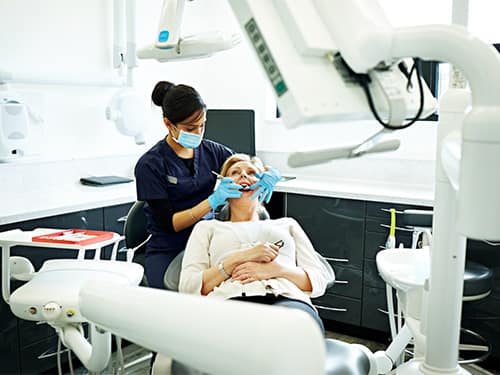Important Dental Assisting Skills: What It Takes to Excel as a Dental Assistant
 Dental assisting is a highly rewarding field that allows you to make a positive impact in the lives of patients and dental professionals alike. This job is by no means easy, however. Dental assistants are the ultimate jacks of all trades.
Dental assisting is a highly rewarding field that allows you to make a positive impact in the lives of patients and dental professionals alike. This job is by no means easy, however. Dental assistants are the ultimate jacks of all trades.
Thorough preparation is important; this should encompass not only skill development, but also, real-world application. This is best achieved by enrolling in quality dental assisting schools, which provide both challenging coursework and numerous opportunities to practice hands-on skills.
Having the Right Technical Skills
Success as a dental assistant begins with developing a wide range of clinical and technical skills while enrolled in dental assistant programs. We’ve highlighted a few of the most critical skills and qualities below:
Knowing Your Dental Terminology
A thorough understanding of dental terminology is vital to success as a dental assistant. As the American Dental Association (ADA) points out, key terms are used “in the course of delivering care to patients, maintaining patient records and preparing claims.” This encompasses a broad range of concepts, such as:
- Dental anatomy. Dental assistants must be able to identify not only the specific types of teeth, but also, dental notation systems that assign numbers to the various teeth. Furthermore, dental assistants should be familiar with the parts of the teeth: enamel, dentin, cementum and pulp.
- Dental concerns. From carries to bruxism and, of course, gingivitis, dental assistants should have a thorough understanding of the many oral concerns and conditions their patients face.
- Processes and procedures. The far-reaching vernacular of a typical dental assistant includes both clinical and administrative terminology. This prepares dental assistants to handle everything from insurance paperwork to processing labs and X-rays.
Don’t Confuse Your Instruments and Equipment
Another terminology essential: understanding which instruments are needed for various procedures — and how they’re used. What’s more, dental assistants are often responsible for sterilizing tools. During procedures, dentists or hygienists often rely on dental assistants to hand them the requisite tools, as this streamlines the process and allows them to focus on the task at hand. It is up to the dental assistant to ensure that dentists and hygienists always have the right tool for the job.
Dental Radiography
Many dental assistants are authorized to perform a variety of radiology services, assuming they are properly trained and supervised. Depending on the scope of the practice, this could mean handling diagnostic, panoramic or even cone-beam computed tomography (CBCT) imaging. The images that dental assistants capture provide valuable insight into patients’ oral health while also helping dentists make difficult decisions about treatment protocol.
Do You Have the Right Interpersonal and Communication Skills?
While many aspiring dental assistants are eager to gain a wealth of clinical skills, communication is arguably just as important. Dental assistants may spend just as much time interacting directly with patients as dentists or hygienists. They set the tone for a positive experience through early interactions that are warm and helpful.
HWhat Does Communication Look Like With Staff and Patients?
Dental assistants often act as an important liaison between staff members and patients. By establishing a strong rapport, they help patients open up about concerns that they might otherwise struggle to discuss. In their interactions with dentists and hygienists, assistants provide powerful support and insight. Yes, they must follow instructions, but self-starters are valued when they can get the job done without micromanaging.
Show Empathy and Compassion to Your Patients
Patients want to know that their dental providers actually care about them as people — not just as teeth to be examined. To that end, dental assistants should express empathy, particularly when patients seem worried or distressed. A compassionate approach will make patients feel more comfortable — and more willing to continue to seek long-term oral care.
Active Listening
In a busy dental environment, it’s easy to get sidetracked or to barely acknowledge what patients are saying. Active listening ensures that patients feel acknowledged and respected — and it can provide valuable insight into the symptoms or lifestyle habits that underscore their oral health concerns. It should come as no surprise, then, that solid listening is highlighted by the Dental Assisting National Board (DANB) as a top skill.
Dental assistants actively listen to their patients by taking the time to not just hear the words patients say, but also, to recognize what their intonation and body language reveals about the underlying message.
Know How to Work as a Team
Dental assistants can instruct patients on proper oral care, but they shouldn’t simply give lectures. Rather, they work with patients to form strong teams, in which every person has a say. This means tailoring solutions based on the unique needs and preferences of each patient — which are easier to discern when displaying empathy or actively listening to patient concerns.
You May Need Administrative Skills
A variety of administrative skills play heavily into the day-to-day work of a typical dental assistant. These professionals keep clinics running smoothly by handling the following administrative tasks:
Keep the Office Organized
An organized office is safer, more efficient, and more pleasant for patients. Dental assistants keep several areas of the clinic organized so that supplies and records are both accessible and secure.
Manage Appointment Schedules
Dental assistants are often responsible for setting and adjusting schedules. This means facilitating regular checkups, as well as appointments for specific treatments or procedures, such as fillings or crowns. Additionally, dental assistants keep these schedules current. This may involve canceling or rescheduling appointments.
Keep Up to Date With Patient Records
Detailed patient records help dentists determine how oral history plays into current concerns. Dental assistants document visits and procedures so that this information is readily available — and easy to understand — if it’s needed in the future.
Chairside Assistance to Dentists
As we’ve discussed, dental assistants may be asked to hand dentists required tools and also oversee imaging, instrument sterilization and a variety of other tasks. Their contributions promote better concentration among hardworking dentists, who simply cannot handle all the moving parts of the clinic on their own.
Know Billing and Insurance
Dental assistants may be tasked with collecting payments and handling insurance reimbursements. These can be complicated procedures that call for exceptional organization and attention to detail. Proper coding and billing promote the long-term profitability and financial viability of the practice.
Where Does Critical Thinking Fit In?
Dental assistants need to anticipate the needs of both patients and staff members. It takes excellent communication and critical thinking skills to master this. Examples include:
Helping Resolve Patient Concerns
While some patient concerns can only be resolved through targeted dental treatments, others can be addressed, to some extent, by industrious dental assistants. For example, dental assistants play a vital role in teaching patients about proper oral health regimens — and by encouraging patients to implement these practices, they can play a vital role in resolving key concerns over time.
Making Smart Decisions in Emergency Situations
In the event of an emergency, dental assistants can play a crucial role in keeping both patients and other staff members safe. Keep in mind that it is not the dental assistant’s job to provide emergency treatment. Still, by recognizing the signs and symptoms of urgent conditions, dental assistants can facilitate the prompt care that suffering patients may require.
Attention to Detail
We’ve touched on a few areas that require impressive attention to detail, such as recording patient histories and dealing with billing or insurance. In reality, however, a detail-oriented approach is valued in every aspect of dental assisting. This is evident in patient care, as a detail-oriented approach helps dental assistants determine the physical and emotional needs of their patients.
Personal Qualities You Should Possess
If you want to succeed as a dental assistant, you will need to develop a variety of qualities that help you relate better to patients while also carrying out a wide range of important tasks.
Be Reliable
Trust is critical in any professional relationship — and especially between dentists and dental assistants. Dentists need to always know that their assistants have their back — and this confidence comes as assistants do their part, day after day.
Be Flexible
The dental environment is always evolving and dental assistants need to keep up. They need to roll with the punches as patient needs, preferences, and even appointments change. What’s more, the needs of dentists and hygienists may also evolve — and dental assistants must keep up.
Be Positive
A positive attitude can be infectious. Dental assistants put patients at ease with their sunny dispositions and can also make clinics or practices less stressful for fellow dental professionals.
Be Patient
Patience for patients could be the new model of the dental industry. It takes time to build a genuine rapport. Patience must also be practiced when, inevitably, dental assistants discover that the patient is not always right. Furthermore, patience should be built into every interaction with fellow staff members, even when supporting meticulous, time-consuming processes.
Dental Assisting Programs with SJVC
If you exemplify the qualities highlighted above, you could be an amazing candidate for a career in dental assisting. Now, it’s time to get started with a highly respected Dental Assisting program. San Joaquin Valley College has an excellent Dental Assisting program that will prepare you to enter the field equipped with critical skills and knowledge. Reach out today for more information.
You might also like
More stories about
Request Information
All fields using an asterik (*) are required.


